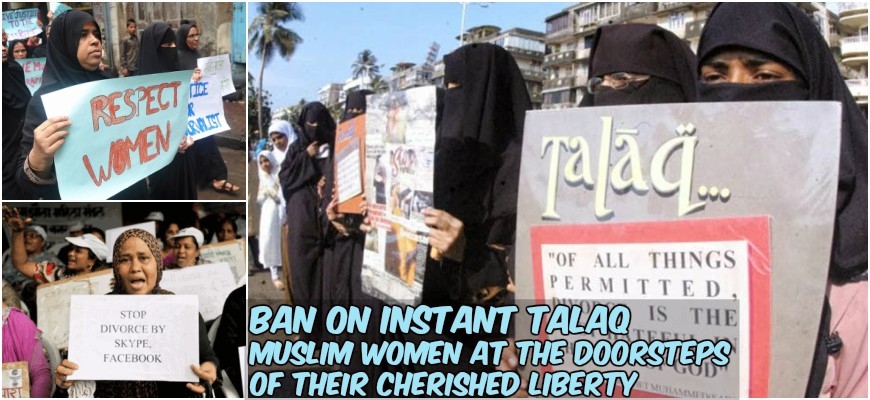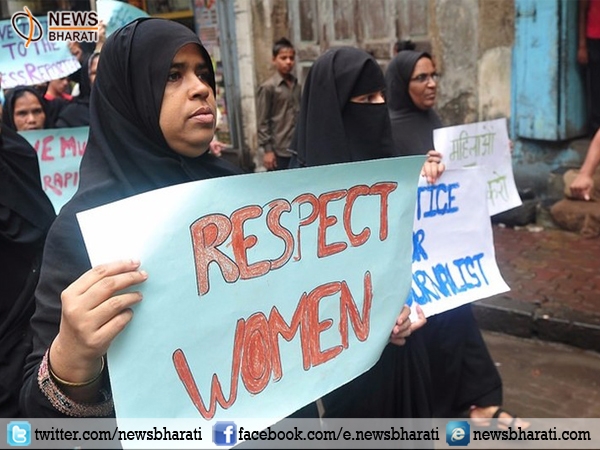New Delhi, December 21: Women all over the world and across the social fabric have faced resistance to their rights in marriage, divorce, inheritance, adoption, and succession. Communities of Indic faith have always been more assimilative and adaptive to the socio-cultural changes and are open to criticism on customs and ceremonies which have been obscurantist. Hence, the Hindu Marriage Act of 1956 and incorporation of its amendment in 2005 gave the much-needed empowerment and subsequent liberty to women in the faith vis-a-vis other communities. However, the change in the political mindset and will in the country post-2014 general elections has been a catalyst in emboldening the women of other faiths to assert for their religious and humanitarian rights.

The year 2017 has been a watershed for the women of the minority community in India. The credit goes to the perseverance and unmitigated resolve of the ordinary Muslim women to question the clergy and demand their fundamental right as citizens of a secular country.
22nd August 2017 was a red-letter day when the historic judgment was delivered which annulled the practice of instant Triple Talaq (also called Talaq-e-biddat) not only generated enthusiasm and a sigh of relief but also vindicated Shah Bano’s prayer.
Shah Bano’s appeal in Supreme Court for maintenance for herself and her five children resulted in a judgment in 1985 which gave her an increased maintenance sum. This was indeed a milestone judgment as the case was delivered as a part of the criminal procedure rather a civil code and initiated the discussion on a much-needed Uniform Civil code. The political dispensation of that time headed by the late Prime Minister Rajiv Gandhi, however, bowed to the pressure of the All India Muslim Personal Law Board (AIMPLB) and passed the Muslim Women (Protection on Divorce Act), 1986 in the parliament which overturned the verdict which was favourable to Shah Bano and entitled maintenance to Muslim women only during iddat period of ninety days. It took more than three decades to turn the tide.
Introducing a draft law in the upcoming winter session of the Parliament for discussion, the government seeks to do the practice of instant Triple Talaq "illegal and void" and provides for a jail term of three years for the husband. It also proposes to give a Muslim woman right to ask for custody of children, maintenance for herself and her minor children from a court. Many political outfits in the country that have been vying for getting political mileage by appeasing and giving patronage to minorities have raised doubts on the credentials of the present government in introducing this law. Many of them are oblivious to the fact that they are being left out in the social alterations that are being witnessed by the nation.
While the spotlight in the media has been fixed on the issue of Triple Talaq, the disparity in the inheritance entitled to a male and female heir in Muslim Personal Law has also been recently put to question in the Delhi High Court. As per the Muslim Personal Law, sons are entitled to twice the share of daughters which is in complete violation of the fundamental right to equality of women as enshrined under Articles 14, 19, 21. Emboldened by the inclination of the executive and the judiciary towards empowering women, reforms are being asked by other minority communities. Parsi Marriage and Divorce Act 1936 provides for separate matrimonial courts where chosen delegates act as jury and aid the judges in disposing of the cases. Decisions in these courts are usually taken as per the majority view and are devoid of mediation and settlement. Women in Parsi community who are married outside the community have questioned the Supreme Court on being restrained from performing last rites of their relatives while men are not restricted to the same. Women from the Parsi community are taking legal proceedings for their religious rights as well as to introduce reforms to expedite the disposal of matrimonial cases.
Muslim women are at the doorsteps of their cherished liberty as the Parliament is set to usher new milestones in gender parity. A redefining of the socio-cultural norms and a subsequent change in the patriarchal mindset is in the offing which will provide for a larger goal of unshackling women from legal, social and political restrictions in the society.
Dr. Geeta Bhatt is an Associate Professor at the University of Delhi. Presently, she is also an elected member of the Academic Council of the University of Delhi. Besides authoring and editing four books and publishing several research papers in international and national journals, she has a teaching experience of twenty years. She is a recipient of Best Teachers award from Department of Higher Education, Delhi Government, 2013-14. She is also actively associated with various social activities.


